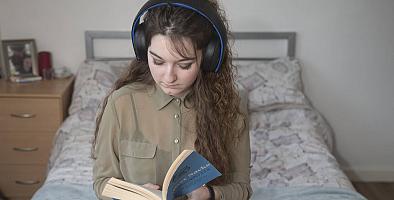MA
Creative and Life Writing
Content navigation menu
Why study MA Creative and Life Writing at Goldsmiths
Have you got a story to tell? Or poems that you want to shape into a collection? This Masters degree will help you develop your creative writing practice. You’ll experiment with a wide variety of forms to help you discover your preferred mode of writing.
- You may be writing regularly; you may be returning to it after concentrating on your career. Whatever your background, if you're serious about your writing, this postgraduate course can help you to develop your practice.
- Our students bring with them a lively range of interests, cultures and experiences. We welcome students of any age who share the drive to take their writing seriously.
- You’ll have the chance to experiment with different forms – poetry, the novel, short story and life writing – and to specialise in one of those areas, and you will receive expert guidance in each field. Read work by our students.
- Some seminars will be taken by visiting writers who will talk about their work, introduce you to different theories of creative writing and engage you in discussion about their writing. Recent visitors have included Ali Smith, Caryl Phillips, Claire Keegan and Daljit Nagra.
- We host weekly readings and discussions organised by our Writers Centre, together with occasional visits from editors, literary agents and organisers of literary projects.
Contact the department
If you have specific questions about the degree, contact Stephen Knight.
Length
1 year full-time or 2 years part-time
Entry requirements
You should have (or expect to be awarded) an undergraduate degree of at least second class standard in a relevant/related subject. You might also be considered if you have relevant experience and can show that you have the ability to work at postgraduate level. See Entry Requirements below
Fees
Home - full-time: £10450
Home - part-time: £5225
International - full-time: £19000
Department
Watch videos about your course
Structure
The programme is taught in person, via workshops and seminars, which are usually taught on one day each week. However, we cannot confirm this will be the case for the next academic year as timetables are not published till just before the start of term.
Full-time students
You will take two modules each Autumn and Spring Term (four in total), and each module is taught via 2.5-hour sessions.
Part-time students
You take the same modules, but one per term, over the course of two years. There are also tutorials, the timing of which is flexible as they are scheduled with the tutor directly.
What you'll study
You will participate in twelve one-on-one tutorials throughout the year.
You'll also take three compulsory modules over the course of the programme:
| Module title | Credits |
|---|---|
| Workshop in Creative and Life Writing | 60 credits |
| Contemporary Contexts for Creative and Life Writing | 30 credits |
| Creative and Life Writing Portfolio | 60 credits |
Note about optional modules (if available): The above is indicative of the typical modules offered, but is not intended to be construed or relied on as a definitive list of what might be available in any given year. The module content and availability is subject to change.
Assessments
Assessment is by the submission of four pieces of writing of 5,000 words each – either an essay, or, for workshops, a piece or pieces of creative or life-writing – plus a critical account of how you have structured and developed your work.
You will also be assessed on a portfolio (maximum of 20,000 words) containing a piece or pieces of creative or life-writing together with a critical account of how you have structured and developed your work.
In all cases, the number of words applies to prose.
Student work

Take a look at Goldfish, an annual journal showcasing work by writers on the programme, including short stories, poetry and life writing.
Written, curated and published entirely by students, every year Goldfish showcases exciting new voices.
What our students say



Careers
Where this degree can take you
Graduates of this programme include writers Tom Lee, Lucy Caldwell, Ross Raisin, Amy Sackville, Rohan Kriwaczek, Evie Wyld, Sara Grant, Naomi Foyle, Bronia Kita, Claire Adam, Lijia Zhang, Luiza Sauma, Ashley Dartnell and Suzanne Joinson and the poets Emily Berry, Andy Spragg, Kate Potts, Jack Underwood, Abigail Parry, Anthony Joseph, Katrina Naomi and Matthew Gregory.
Among them they've won or been shortlisted for awards including:
- Desmond Elliott Prize 2019
- The Sunday Times/EFG Private Bank Short Story Award 2012
- Rooney Prize for Literature 2011
- Dylan Thomas Prize 2008 and 2011
- The Sunday Times Young Writer of the Year Award 2009
- John Llewellyn Rhys Prize 2009 and 2010
- Several Eric Gregory Awards
- Guardian First Book Award
- New Writing Ventures Prize
- Several Betty Trask Awards
Other graduates have gone on to work in publishing (for example, as senior commissioning editors), journalism, public relations, teaching, advertising, the civil service, business, industry, and the media.
Skills
The MA will enable you to develop transferable skills, including: enhanced communication and discussion skills in written and oral contexts; the ability to analyse and evaluate different textual materials; the ability to organise information, and to assimilate and evaluate competing arguments.
Find out more about employability at Goldsmiths.
Entry requirements
You should have (or expect to be awarded) an undergraduate degree of at least second class standard in a relevant/related subject.
You might also be considered for some programmes if you aren’t a graduate or your degree is in an unrelated field, but have relevant experience and can show that you have the ability to work at postgraduate level.
We consider applications from candidates without literary backgrounds. In this case, we would focus on the applicant's relevant experience, the quality of their portfolio and evidence of wider reading. Applicants from a non-literary background often bolster their CV with short creative writing courses, to demonstrate written skills and the ability to work in a team.
International qualifications
We accept a wide range of international qualifications. Find out more about the qualifications we accept from around the world.
If English isn’t your first language, you will need an IELTS score (or equivalent English language qualification) of 7.0 with a 7.0 in writing and no element lower than 6.5 to study this programme. If you need assistance with your English language, we offer a range of courses that can help prepare you for postgraduate-level study.
How to apply
Apply directly to Goldsmiths using our online application system
Before submitting your application you’ll need to have:
- Details of your academic qualifications
- The email address of your referee who we can request a reference from, or alternatively a copy of your academic reference
- Copies of your educational transcripts or certificates
- A personal statement – this can either be uploaded as a Word Document or PDF, or completed online. Please see our guidance on writing a postgraduate statement
- You must also submit a portfolio of your creative or life writing with your application - see below for details
You'll be able to save your progress at any point and return to your application by logging in using your username/email and password.
Portfolio
You must submit a portfolio as part of your application. This can include two or three short stories, 12-20 poems, or several extracts from a novel. You can include a combination of genres in your portfolio to reflect your writing practice, with a mixture of short stories, poems, extracts from a novel or larger piece, and life writing.
There's no set word limit, but we'd recommend no more than 3,000 words of prose.
Please make sure portfolios are in 12pt font with double-line spacing.
When to apply
We accept applications from October for students wanting to start the following September. There is no fixed deadline for submitting your online application.
However, please note that due to the popularity of the programme and the large number of applications, places fill up quickly. We aim to process applications within three months of receipt of receiving your full application, including references. This may take longer during busier periods and holidays.
We encourage you to complete your application as early as possible, even if you haven't finished your current programme of study. It's very common to be offered a place that is conditional on you achieving a particular qualification.
If you're applying for funding, you may be subject to an application deadline.
For more information about the programme please contact the Department of English and Creative Writing.
Selection process
As part of the selection process, you may be invited to an online or in-person interview. Occasionally, we'll make candidates an offer of a place on the basis of their application and qualifications alone.
Find out more about applying.
Fees and funding
Annual tuition fees
These are the PG fees for students starting their programme in the 2025/2026 academic year.
- Home - full-time: £10450
- Home - part-time: £5225
- International - full-time: £19000
If your fees are not listed here, please check our postgraduate fees guidance or contact the Fees Office, who can also advise you about how to pay your fees.
It’s not currently possible for international students to study part-time under a student visa. If you think you might be eligible to study part-time while being on another visa type, please contact our Admissions Team for more information.
If you are looking to pay your fees please see our guide to making a payment.
Funding opportunities
Use the Goldsmiths scholarships finder below to find out what funding you may be eligible for.
Paying your fees
Find out about paying your tuition fees.
If you are a UK student you may be eligible for a postgraduate loan.
Meanwhile our Careers Service can also offer advice on finding work during your studies.
Additional costs
In addition to your tuition fees, you'll be responsible for any additional costs associated with your course, such as buying stationery and paying for photocopying. You can find out more about what you need to budget for on our study costs page.
There may also be specific additional costs associated with your programme. This can include things like paying for field trips or specialist materials for your assignments. Please check the programme specification for more information.


.jpg)


